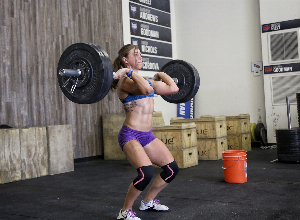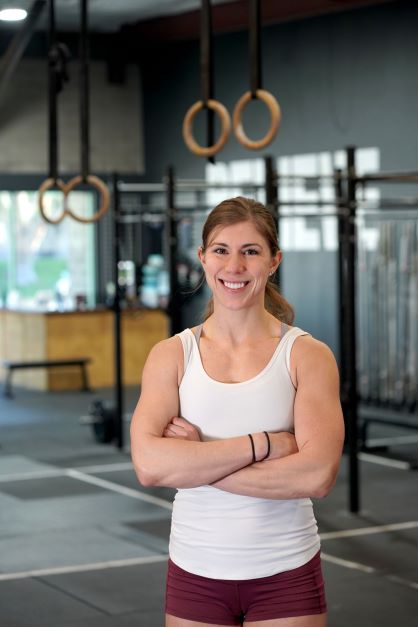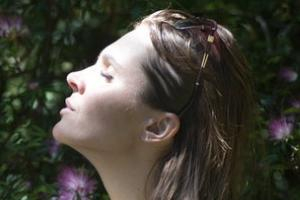Lupus: "As weak as you may feel now, know that you can feel strong again!"
Published 23 Nov 2022 • By Rahul Roy
Megan, a resident of Arizona, USA recounts her experiences battling Lupus as a young girl, where she promised herself that she would not let fear stop her from living life. This led her down a road of fitness and self-development that shaped not just her life but motivated her to help people embark on their own fitness journeys as well.
Discover her story here!

Hello Megan, you have agreed to testify on Carenity and we thank you for it.
First of all, could you tell us more about yourself?
I am currently 32 years old. I live in Arizona with my fiance and 2 pups, and I own ATOP Coaching, an online health coaching company. I love hiking and being in nature, working out hard at the gym, growing my business, and practicing yoga and meditation. Oh, I also LOVE food.

You have lupus. When did lupus appear in your life? Could you tell us what your first symptoms were? How did you feel about these symptoms?
I was 12 years old when I was diagnosed. SO yes, I have had Lupus for 20 years now. Its hard to remember what life was like before lupus, but I definitely remember when symptoms started presenting themselves. My joints started getting super achy and painful, I had a really intense butterfly rash on my face, I lost my appetite, had a low grade fever, and my energy levels were super low. I felt too drained to do anything. I had a major fear of needles and so I dreaded going to all of the doctor appointments.
At what point did you decide to see a health professional? How long did it take to make the diagnosis? How many doctors did you see?
At first my mom thought the joint pains were “growing pains” but it didnt take long for other symptoms to present themselves and before I knew it I wasb of doctors' appointments. I was super lucky that my primary care had a hunch about it right away. I think the butterfly rash worked in my favor here. I saw him a couple times before he referred me to my childhood rheumatologist
How did you feel when you were told of the diagnosis? Were you able to receive all the necessary information on what the disease was?
I remember time slowing down. I still remember what the room looked like and the feeling that came up within me. It was like I had suddenly been shaken awake. I was told I couldnt go in the sun, that prednisone would cause me to gain weight, and that I would be coming back frequently to get poked with needles until we could get my disease activity under control. Chronic illness stood out to me the most. The fact that there was no cure. Even at that age, I knew my life would never be the same. I was very sick and even wondered how much time I had left. I couldnt fully comprehend what this all meant to me, but that was likely also due to me blocking it out. I looked to my mom and she stood strong. Bless her, she was only 32 at the time but she managed to stay strong and made me feel like it would eventually be okay. At 12 years old my biggest worry before this point was how I would be able to avoid roller coasters while on my 6th grade field trip to 6 flags. I was terrified of heights. In that room that day, I made the decision that I would never allow fear stop me from living my life. Life seemed too short. I still had so much more I wanted to experience. So I decided I would ride those roller coasters…and thats exactly what I did. A simple, yet powerful lesson that I have carried with me.
How do you feel about your lupus care and follow-up? What would you like to change / improve?
My mom handled most of this. The hardest part was how long I would have to wait to see my rheumatologist. Sometimes she would run hours behind. Looking back, this gave me the opportunity to appreciate where I was in my journey. Since my doctor was at a childrens hospital, I would watch the other kids who seemed so much sicker than me. As bad as I felt, I was grateful for where I was. Those other kids that were bald, in wheelchairs, and still smiling inspired me. If they were strong enough to fight, so was I.
Are you on any medication? If so, which ones? Do they suit you?
I am currently off of all of my medications. I try to keep it that way since I was on so many as a young child. If I notice a flare coming on, I will occasionally go on plaquenil, but that will only be once in a while for short periods of time. I respond very well to plaquenil. I haven’t been on prednisone in over 6 years.
Do you implement in your daily life some more natural alternatives to improve your health? What changes have you noticed?
Yes, I revolve my whole life around natural alternatives. I work out and lift weights daily and I eat a whole food diet that’s personalized to me and my needs. I stay away from dairy, gluten, sugar, and eat lots of veggies and very few processed foods. I focus on my gut health and keeping inflammation to a minimum. I also practice various stress reduction techniques such as meditation, journaling, and yoga. I get a solid 8 hours of sleep every night, and take additional supplements to ensure my body is getting all the nutrients it needs. My whole life revolves around keeping myself healthy through preventative measures and I actually enjoy doing these things because they make me feel good and keep me free from Lupus.
What is the impact of the disease on your daily life? Are there things you cannot do or that you prevent yourself from doing?
Currently the biggest impact is fatigue. Sometimes I do have to say no to going out with friends simply because I need sleep. I tune into my body. Since I have been in this place of remission for so long, I do still allow myself to enjoy life and one in a while I’ll still pull all nighters out with friends and indulge in desserts(although, I usually still keep it gluten free). It is because I am so dialed in 90% of the time that I am able to live like a normal person when I choose to. I dont feel like Lupus holds me back from anything I truly want to do.
Do you talk easily about your condition to those around you? Do they understand the disease? Do you feel supported?
I do talk about it. I talk about it publicly in hopes of inspiring others to dive deep into preventative measures as well. Doctors don't tell you about the importance of nutrition, stress reduction, and movement. I try to explain to people that my reality is not the norm for someone with lupus, that I put a lot of effort into staying healthy. As much as I enjoy spreading awareness, I don't want people to think Lupus is a minor condition by any means. I will never forget what it felt like to be at my sickest. Its debilitating.
What got you into fitness in general and has lupus affected your fitness regime?
Once I was able to go back to school after my initial diagnosis, I started going to the gym with my mom. She helped me realize that movement, although it hurt at first, actually made my joints and body feel better by the end so I continued to make sure it was a part of my life. I had a major flare in high school and was bedridden for multiple months. During that time, I made a promise to myself that I would never allow myself to feel so weak again. Once I was able to function again, I hired a personal trainer to help teach me about weightlifting. I fell in love with feeling strong. So I would almost say that being diagnosed with Lupus is what got me into fitness and since having Lupus has always been my main motivation to workout, I would say it has only helped. While I don't know what it would be like to workout without Lupus, I was still able to compete at a very high level fitness competition and do very well against healthy people.
You are quite active on your social media page @megbenzhealth. What motivated you to start your page and what messages would you like to convey?
Once I experienced how much nutrition and fitness helped me feel good and healthy again, it became my mission to spread this knowledge to as many people as possible. Doctors visits and medication does not have to be a part of your life for forever. I encourage people to listen to their doctors, but also begin to incorporate movement and whole foods into their diet. Easier said than done. This is why I have dedicated my life to helping people slowly begin to make these changes by walking the path with them.
What advice would you like to give to Carenity members who are also affected by lupus?
Do not settle for pain everyday. Do not give in to Lupus. As weak as you may feel now, know that you can feel strong again. Believe that its possible to heal yourself. Start slowly by incorporating more movement and healthier eating into your daily routine. Even adding 10min of walking into your day can make a big difference if you are sedentary. Dont expect anything to happen suddenly. It takes time for the body to heal so consistency and dedication to your health is so important. It’s not an easy journey, but it’s a lot easier than feeling sick everyday.
Any last words?
Thank you so much Carenity for helping me share my story and inspire others. Please follow me @megbenzhealth on instagram and tiktok and reach out to me at megan@atopcoaching.com if you are interested in jumping on a free call. You owe it to yourself to fight for your health. Life is worth living and every step forward makes a difference.
A big thank you to Megan for her testimony!
Was this testimony useful to you?
Click on "Like" and share your thoughts and questions with the community in the comments below!
Take care of yourself!
Comments
You will also like

Fifteen percent of osteoporosis patients who take 'drug holidays' suffer bone fractures
7 May 2018 • 8 comments

Dietitian Tanya helps the Lupus community to reduce their symptoms with diet and healthy living.
23 Aug 2023

 Facebook
Facebook Twitter
Twitter
